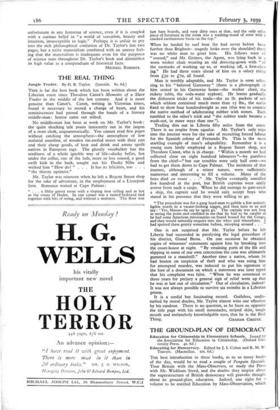THE REAL THING
Jungle Trader. By H. R. Taylor. (Jarrolds. 8s. 6d.)
THIS is far the best book which has been written about the Liberian coast since Theodore Canot's Memoirs of a Slave Trader in the middle of the last century. And it is more genuine than Canot's. Canot, writing in Victorian times, found it necessary to record a change of heart, and his reminiscences had passed through the hands of a literary middle-man : horror came out stilted.
No middle-man has been at work on Mr. Taylor's book : the quite shocking tale pours innocently out in the jargon of a store clerk, ungrammatically. You cannot read five pages without catching the atmosphere—the atmosphere of low malarial coastline, of wooden tin-roofed stores with their rats and their cheap goods, of heat and drink and astute spoilt natives in European rags. The ghastly vocabulary has the seediness of a whole ignoble way of life—dusky belles, hot under the collar, one of the lads, more or less soused, a good swift kick in the back, sought out his Dusky Nibs and wished him "How do! " . . . It has its felicities, too . . . " the thirsty optimist."
Mr. Taylor was nineteen when he left a Regent Street shop for the sake of adventure, in the employment of a Liverpool firm. Romance waited at Cape Palmas : " . . . a filthy garret room with a sloping iron ceiling and as hot as the ovens of Hades. In one corner was a rusted bedstead tied together with bits of string, and without a mattress. The floor was just bare boards, and very dirty ones at that, and the only other piece of furniture in the room was a washing-stand of sorts with a cracked earthenware basin on the top."
When he landed by surf boat (he had never before been further than Brighton: tragedy looks over the shoulder) there was no white man to greet him. His fellows were all
" soused," and Mr. Grimes, the Agent, was lying back in a worn wicker chair wearing an old dressing-gown with " all the earmarks of working up to, or working off, a first-class jag." He had three years ahead of him on a salary rising from £5o to 470, all found.
Man is terribly adaptable, and Mr. Taylor is soon refer- ring to his " beloved Garraway " (there is a photograph of him seated in his Garraway home—the wicker chair, the rickety table, the soda-water syphon). He learns gradually the dishonest tricks of his trade—the 20 lb. packets of salt which seldom contained much more than 15 lbs., the scales
fixed to show four hundredweight as one (this was to counter the native method of adulterating rubber with stones. Each
tumbled to the other's trick and " the rubber trade became a
wash-out, in more ways than one ").
Trading dies out in Liberia fifty miles from the coast.
There is no respite from squalor. Mr. Taylor's only trips
into the interior were for the sake of recruiting forced labour for the Spanish colony of Fernando Po. This is the most startling example of man's adaptability. Remember it is a
young man lately employed in a Regent Street shop, not Theodore Canot, who is in charge. " Within a month we had collected close on eight hundred labourers "—by purchase from the chief—" but our troubles were only half over—we had to get them down to Cape Palmas. The incidents of that journey, although of a minor nature, were sufficiently
numerous and interesting to fill a volume. Many of the boys died en route . . ." Mr. Taylor eventually corralled
five hundred at the port, but British captains were oddly averse from such a cargo. When he did manage to gate-crash a ship, the captain said he would only accept boys who stated in his presence that they were willing to go.
"The procedure was for a gang head-man to gabble a few unintel- ligible words to a vacant-looking nigger, and then turn to us and say : Yes, Massa—he say he agree go.' The captain was not long in seeing the point and confided in me that he had to be careful as he had some American missionaries on board bound for the Congo, and they would naturally enquire into the whys and wherefores. I had spotted these gentry sometime before, snooping around . . . "
One is not surprised that Mr. Taylor before he left Liberia had succeeded in paralysing the legal procedure of his district, Grand Bassa. On one occasion he obtained copies of witnesses' statements against him by breaking into the court-house at night. " By retaining parts of the file and slipping in some of our own concoction the case was ultimately gummed to a standstill." Another time a native, whom he had beaten on suspicion of theft and who was suing him for attempted murder, was induced to put his signature at the foot of a document on which a statement was later typed that his complaint was false. " When he was sentenced to three years for perjury a general sigh of relief went up that he was at last out of circulation." Out of circulation, indeed! It was not always possible to survive six months in a Liberian prison.
It is a sordid but fascinating record. Guileless, undis- turbed by moral doubts, Mr. Taylor almost wins our affection by his candour. There is no question, as he faces us opposite the title page with his small moustache, striped shirt, tough mouth and melancholy knowledgable eyes, that he is the Real










































 Previous page
Previous page